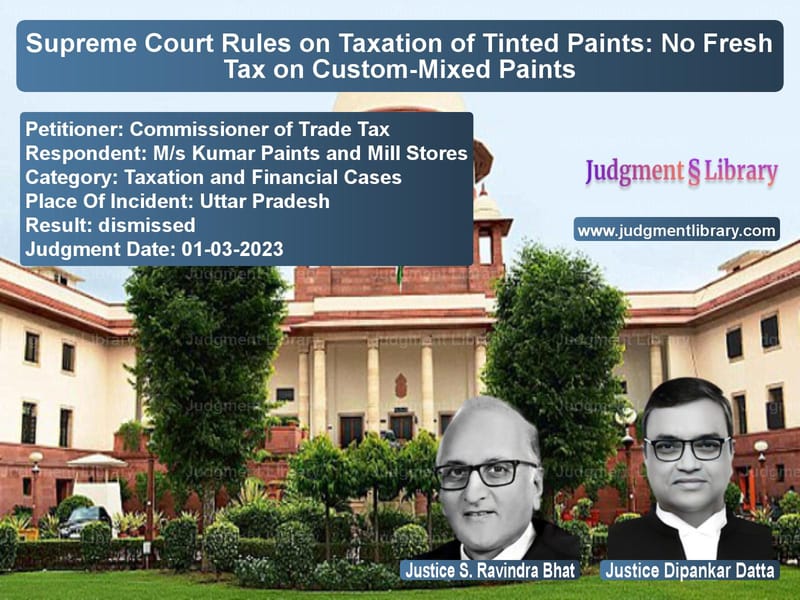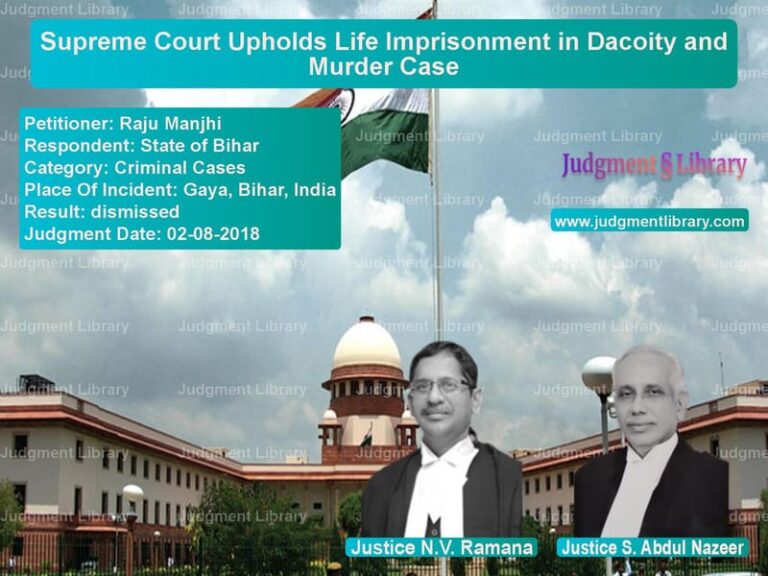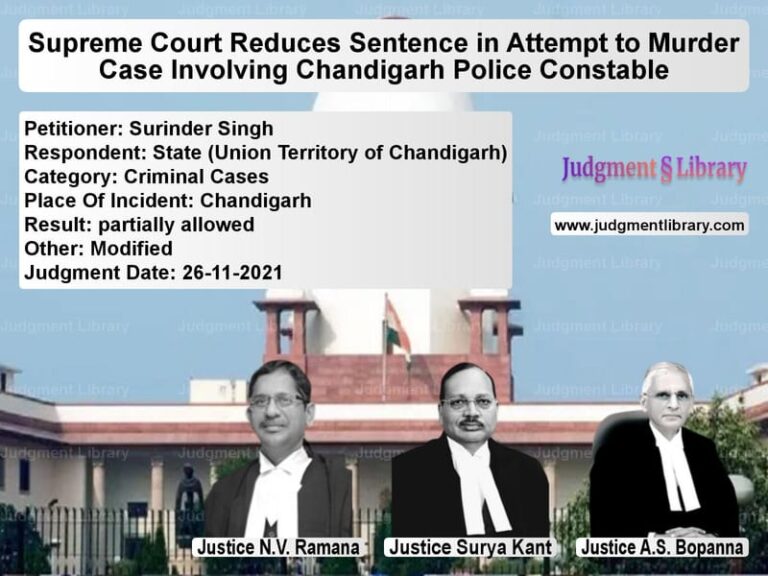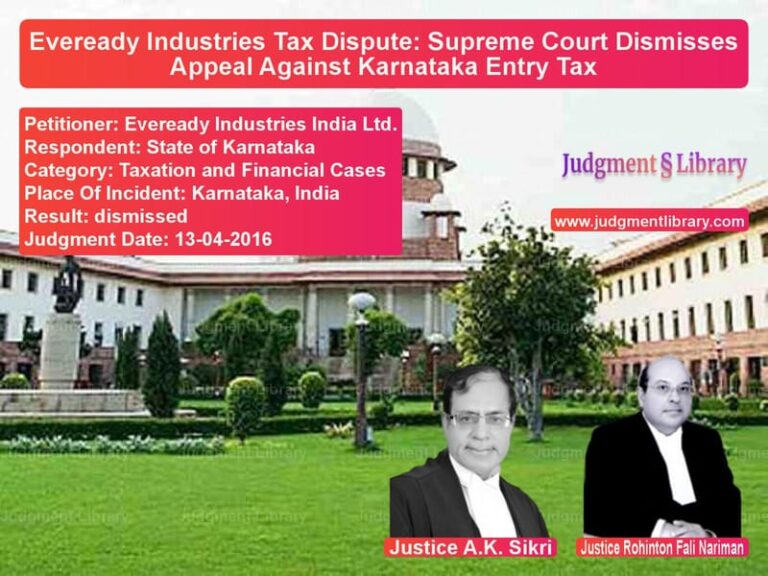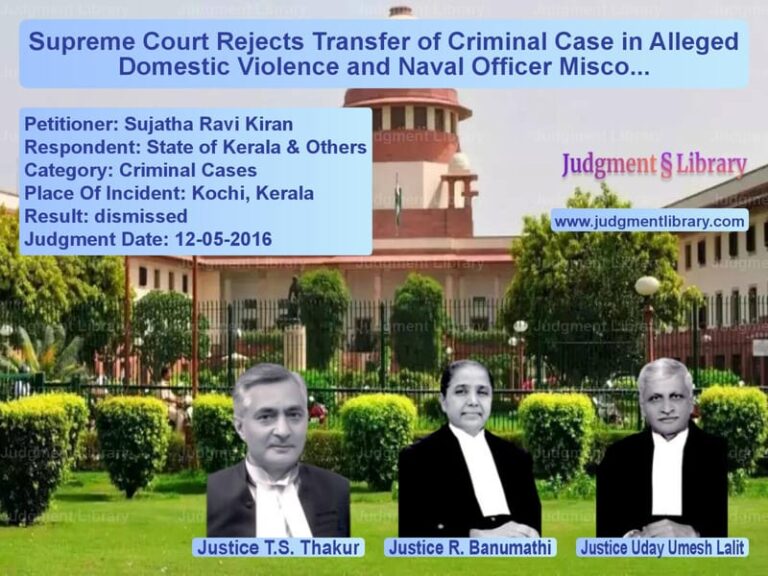Supreme Court Rules on Taxation of Tinted Paints: No Fresh Tax on Custom-Mixed Paints
The Supreme Court of India has ruled in favor of M/s Kumar Paints and Mill Stores, clarifying that adding colorants to base paint using a digital tinting system does not constitute ‘manufacture’ under the U.P. Trade Tax Act, 1948. The ruling, delivered in Commissioner of Trade Tax v. M/s Kumar Paints and Mill Stores, prevents the imposition of additional trade tax on tinted paints, significantly impacting the taxation of customized paint-mixing processes.
The case revolved around whether the process of mixing base paint with colorants through a digital tinting system (DTS) led to the creation of a new product, thereby attracting additional tax liability. The Uttar Pradesh Trade Tax Department argued that the tinted paint, being distinct in color and specification, should be treated as a separate product and subjected to fresh taxation.
Background of the Case
M/s Kumar Paints and Mill Stores operates a paint retail business where customers select base paints that are customized using a digital tinting system (DTS) to achieve desired shades. The store purchases base paints and colorants separately, which are taxed at the first point of sale. When a customer requests a specific shade, the base paint and colorants are mixed using a computer-controlled tinting machine.
The Uttar Pradesh Trade Tax Department issued tax notices to the company, arguing that tinted paints are distinct from base paints and should be considered a new commercial commodity. The department relied on its interpretation of the definition of ‘manufacture’ under the Trade Tax Act, which includes any process that results in a commercially different product.
Petitioner’s Arguments (Commissioner of Trade Tax)
The Trade Tax Department, represented by its legal counsel, made the following arguments:
- The process of adding colorants to base paints results in a new, customized product with a distinct commercial identity.
- As per Sonebhadra Fuels v. Commissioner Trade Tax, any alteration that significantly modifies the commercial character of a product constitutes ‘manufacture.’
- The final tinted paint differs in specification from the base paint and should be taxed separately.
- The commercial purpose of the paint changes after the tinting process, as customers specifically purchase the customized shade rather than a generic base paint.
Respondent’s Arguments (M/s Kumar Paints and Mill Stores)
The respondent countered the department’s arguments, asserting:
- The base paint and the tinted paint remain the same in terms of chemical composition and function.
- The addition of colorants does not alter the essential nature of the product, as it continues to be paint used for the same purpose.
- Expert reports confirm that tinting does not change the fundamental properties of the base paint; it merely adjusts the shade.
- Taxing tinted paints separately would amount to double taxation since the base paint and colorants have already been taxed at the initial sale.
- Past Supreme Court rulings, such as State of Maharashtra v. Mahalaxmi Stores, have established that minor processing changes do not necessarily result in ‘manufacture.’
Supreme Court’s Judgment
The Supreme Court bench, comprising Justices S. Ravindra Bhat and Dipankar Datta, ruled in favor of M/s Kumar Paints and Mill Stores, rejecting the State’s contention that tinting constituted ‘manufacture.’
“The essential character of the product remains unchanged. No new commercial commodity emerges from the tinting process, and therefore, it does not attract fresh tax liability.”
The Court emphasized the following points:
- The function of the base paint remains the same before and after tinting.
- The expert report from Harcourt Butler Technical University concluded that the process does not chemically alter the product.
- The case fails the test laid down in Union of India v. Delhi Cloth and General Mills, which established that ‘manufacture’ must bring a new product into existence.
- The separate taxation of base paints and colorants ensures that the tax liability is already accounted for at the first point of sale.
- Charging additional tax would amount to double taxation, which is not permissible under the law.
Key Takeaways from the Judgment
For Businesses:
- The ruling prevents the imposition of double taxation on tinted paints.
- Paint dealers using digital tinting systems can continue operations without additional tax liability.
- Retailers should ensure that invoices clearly separate the sale of base paints and colorants to avoid tax disputes.
For Tax Authorities:
- The judgment clarifies that a mere alteration in appearance does not amount to ‘manufacture’ unless a new commercial product is created.
- The ruling sets a precedent for distinguishing between mere processing and true manufacturing.
- Tax departments must evaluate the substance of a process rather than relying on superficial changes to classify goods.
For Legal Practitioners:
- The decision reinforces the necessity of expert reports in tax classification disputes.
- Future cases involving minor modifications in products will likely reference this ruling.
- The ruling underscores the importance of using established legal tests to determine whether an activity constitutes ‘manufacture.’
Conclusion
The Supreme Court’s decision in Commissioner of Trade Tax v. M/s Kumar Paints and Mill Stores upholds the principle that minor alterations do not create a new taxable product. By rejecting the State’s argument, the ruling ensures that businesses are not subjected to unwarranted taxation, maintaining consistency in trade tax jurisprudence.
This decision provides much-needed clarity for industries that involve minor processing or customization, ensuring that tax authorities cannot impose fresh levies unless a product is fundamentally transformed. The ruling reinforces that tax law should be applied with a view to maintaining fairness in commercial transactions, preventing undue burdens on businesses that do not truly engage in manufacturing.
Petitioner Name: Commissioner of Trade Tax.Respondent Name: M/s Kumar Paints and Mill Stores.Judgment By: Justice S. Ravindra Bhat, Justice Dipankar Datta.Place Of Incident: Uttar Pradesh.Judgment Date: 01-03-2023.
Don’t miss out on the full details! Download the complete judgment in PDF format below and gain valuable insights instantly!
Download Judgment: commissioner-of-trad-vs-ms-kumar-paints-and-supreme-court-of-india-judgment-dated-01-03-2023.pdf
Directly Download Judgment: Directly download this Judgment
See all petitions in Customs and Excise
See all petitions in Tax Refund Disputes
See all petitions in Judgment by S Ravindra Bhat
See all petitions in Judgment by Dipankar Datta
See all petitions in dismissed
See all petitions in supreme court of India judgments March 2023
See all petitions in 2023 judgments
See all posts in Taxation and Financial Cases Category
See all allowed petitions in Taxation and Financial Cases Category
See all Dismissed petitions in Taxation and Financial Cases Category
See all partially allowed petitions in Taxation and Financial Cases Category

